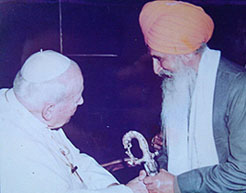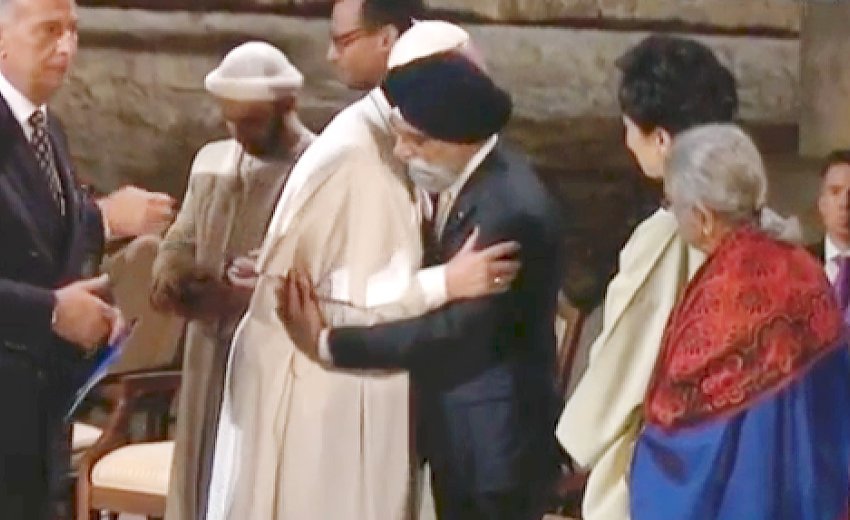At various times, the Sikh politicians, the clergy itself and many voices in the Sikh community have compared those at the helm of the temporal seats with papacy, but are our clerics equipping themselves to engage with the modern world and the emerging discourses? It is time to learn from the mistakes of the papacy and prepare ourselves for a new world where not a single child has ever dialed a phone and those uninitiated into the mystery called internet will be merely seen as an oddity.
As the sage said, it is always good to learn from mistakes other people make.
The Sikh clergy will do well to study the way the Vatican functions, and should ponder over the way the Pope’s African visit was mismanaged. There are many lessons to be learnt. The highest clergy is often the face of the community and its power and privilege to argue and position or reposition the community’s response to long term or imminent situations imposes immense and grave duties on those at the helm.
We are living in a new world order and the message of Sikhism needs to be communicated using the new technological advances made in the world. If a Sikh Guru sent some Sikhs to far off places to learn new skills and improve their knowledge, the message for us is simple. We must continuously equip ourselves and be better positioned to meet the challenges of a changing world order.
During his recent visit to Africa, the papacy has come under criticism for its handling of the reinstatement of Holocaust-denying bishop. The Sikhs will do well to remember that apart from the high profile cases of ex-communication and reinstatement into the religious fold, there are numerous cases decided every now and then of complaints against one or the other granthi, ragi etc. A number of cases involve the upkeep of the Sikh holy scriptures.
Any detailed study into such cases, and the way they are decided, is not going to show the clergy or the administration of religious domain, in any good light.
A little while ago, the Shiromani Khalsa Panchayat had followed the case of a self-styled Baba Dhanwant Singh who was accused of rape of a minor girl. He was let off lightly by the top clergy and later accusations had emerged that a close kin and associate of the then Akal Takht jathedar, who acted as his PA legally and illegally at separate times, was involved in highly objectionable deals with the culprit baba. The same self-styled holy man was later taken to court on the same issue and was convicted and sentenced to a ten-year jail term.
Thankfully, so far, the actions of the Sikh clergy are not coming under a microscopic lens otherwise any intensive study of our clergy’s actions and statements will bring a lot many problems in its wake. But may we posit the same question and ask what role are the people around the clergy playing? Whom do the clerics consult on various actions and statements?
 The recent backtracking by the Akal Takht jathedar on the issue of implementation of the Akal Takht hukumnama to get the Dera Sirsa shops shut down is part of the pattern that the clergy has been playing out for long. At a time when the Sikh nation’s rage seemed spilling over, the Akal Takht hukumnama was seen as a true representation of the community’s wishes, but as soon as the political pressure was upped and the ruling Akali Dal seemed to need the votes of the Dera Sirsa followers, a new interpretation of the ways that the Sikh nation can adopt to implement the edict has been spewed out with a straight face by the top cleric.
The recent backtracking by the Akal Takht jathedar on the issue of implementation of the Akal Takht hukumnama to get the Dera Sirsa shops shut down is part of the pattern that the clergy has been playing out for long. At a time when the Sikh nation’s rage seemed spilling over, the Akal Takht hukumnama was seen as a true representation of the community’s wishes, but as soon as the political pressure was upped and the ruling Akali Dal seemed to need the votes of the Dera Sirsa followers, a new interpretation of the ways that the Sikh nation can adopt to implement the edict has been spewed out with a straight face by the top cleric.
Jathedar Gurbachan Singh has now said even blocking traffic is against the traditions of Sikhism. What kind of a religious interpretation is that for the Sikhs who so far were told that the word of the Akal Takht is akin to the word of the Lord? And why, pray, is the Akal Takht jathedar getting into interpreting the religious doctrine over blockade of traffic on some godforsaken road?
For heaven’s sake, let’s not shame ourselves.
One jathedar not very long ago talked of “off with their heads” approach, then went back on it, recently announced a program to send marjeevras, then claimed he was merely announcing other people’s programme, and now says sending marjeevras is wrong. The Akal Takht jathedar is not only trying to stop others, he is also usurping the powers that have not been conferred on him.
He has said that only Akal Takht can give a programme to the Sikh community.
It is our considered view that our clerics must understand that they have it in their power to articulate the community’s collective will and plans but they must side step issues that are divisive and on which a collective view is yet to emerge.
The Pope made the mistake when he talked of measures to stop Aids and said that they only aggravated the fight against Aids. His remarks about “violent and irrational” Islam in 2006 still rankle the Muslim world. His visit to Cameroon and Angola remained overshadowed due to many wrong actions and statements. And critics are now questioning what was the Vatican public relations team doing all this while.
Thankfully, so far, the actions of the Sikh clergy are not coming under a microscopic lens otherwise any intensive study of our clergy’s actions and statements will bring a lot many problems in its wake. But may we posit the same question and ask what role are the people around the clergy playing? Whom do the clerics consult on various actions and statements? In case of the Pope, it is known that the pontiff’s remote style is responsible to some extent but that is because he is, by nature, a shy, professorial theologian.
The Sikh priests, at least those currently at the helm, are not. If the footfalls heard in the papal apartment after sunset are only those of the Pope and Father Georg Gänswein, his secretary, then the footfalls heard around our clergy are those of Akali circle presidents, jathedars, small time political activists and people of sometimes questionable credentials. Virtually every journalist has access to the topmost clergy at all times of the day and night and we haven’t see much respect in the tone and tenor employed in journalism when reporting on Sikh religious affairs and clergy.
A jathedar moving around with a laptop will not necessarily make for a better religious person but may be it will help to know that Pope Benedict’s media operation chief Archbishop Claudio Maria Celli, 67, has now ensured that laptops enter Vatican. New media technologies are creating a new environment, a new culture, and it is necessary that our clergy equips itself to engage with the debates, discourses and aspirations of the community so that it can spread the holy word better and far and wide.
A new generation of Sikhs is coming up, the one which has never dialed a phone. This is the push button generation. It has no recall of people who have no idea of the wonders of information technology. It knows no one who does not have an email id. And it is ready to look for God on the Facebook.
We are not suggesting that the Jathedars be on Facebook, please also do not suggest that the children looking for God on the Facebook will get frustrated and return to the traditional ways and start listening to our jathedars. But it will certainly help if we have Jathedars who understand the importance of their own role, position and articulation, and could guide the community towards a better future. One way is not to frustrate the collective will. If all the jathedars are seen as almost affiliated with a particular political party or a family, surely we should thank our stars that the media does not give as much importance to the Sikh clergy as the western media gives to the papacy. Otherwise, our jathedars are capable of supplying so much mirth and grist to the journalistic mills that the holy father sitting in the middle of Rome will find it difficult to get in a word edgewise into our newspapers.
